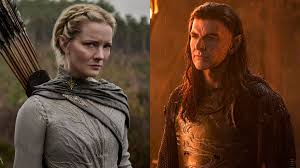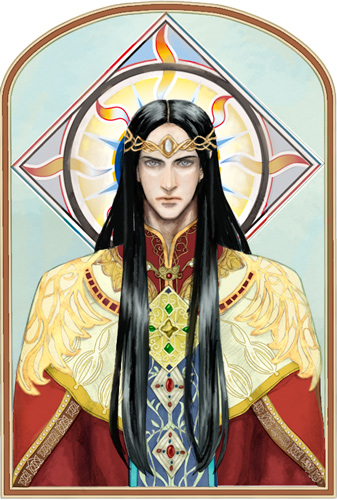One week on from the drawing to a close of Season 2 of The Lord of the Rings: The Rings of Power, here at TORn we are enjoying the opportunity to rewatch and reflect on all eight episodes as one story arc. Scenery, design, costumes, music – all are compelling. Perhaps the greatest asset of this show, however, is the extraordinary cast. Brought together by skilled casting directors, they are an enormously talented group who rarely put a foot wrong, delivering even the occasional clunky lines of the script with style and aplomb.
Hazeldine at San Diego Comic Con
Some members of this team are experienced theatrical actors, and their stage craft is evident in their creation of character. One such is Sam Hazeldine, who had the unenviable task of stepping into the role of Adar for Season 2. Joseph Mawle’s rendition of the character was, for many, one of the highlights of Season 1. When I met Hazeldine at San Diego Comic Con, I was curious to know if he felt daunted, taking on the mantle of an already popular performance. He told me that the strength of Mawle’s performance actually made it easier to take on the role; because he enjoyed and admired the choices Mawle had made, he found it easy to run with them, whilst also finding his own way into the mind of the ‘father’ of the orcs (or as Adar would prefer, Uruks).
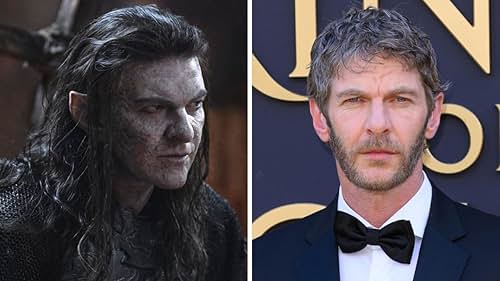
Weeks later, with the final episode of Season 2 airing, I had the opportunity to chat with Hazeldine again, and see how he felt now that his Adar was out there.
Here’s what he had to say:
greendragon: The last time we met was at San Diego Comic Con. We talked then briefly about stepping in and taking on the mantle of a role that had been played by another actor in Season 1, and you seemed very calm about it. I wonder how you’re feeling now that the season is out, and what reaction you’ve picked up on from viewers?
Sam Hazeldine: It seems to be positive!
GD: Did you have any trepidation at all?
SH: You know, somebody had to take over the role. I was lucky enough it was me! Even if it was a kind of beloved performance [from Joseph Mawle], the fact of the matter is it wasn’t going to be the same actor anymore anyway. So I guess it was just incumbent upon me to try and uphold and continue in the direction that the previous actor was going, and just to do my best. And yeah, I guess I did feel comfortable about that and, as I said before, it made it easier that I really liked Joseph, and the character that he – and the showrunners, obviously – had created. So it was a pleasure, really, that’s all. It’s nice that it seems to have been responded to well.
I think Adar has a new mission in Season 2, anyway; so it is a slight divergence from what went before in those terms. But [I was] trying to keep the conflict that I felt, with Joseph’s performance, was one of the greatest things about it; and understanding why that is. I think that more of that’s been revealed in Season 2 – or it’s been alluded to: what he’s been through, and why he feels this enormous burden of responsibility for his children.

Adar’s care for the Uruks
GD: I wonder – in your interpretation of the character, how ruthless do you think he is? It’s very interesting to me that he’s been, in some ways, a very sympathetic character; surprisingly so, because for most of Season 1, he was the knowable villain that we had, and yet he’s been very sympathetic. But as Season 2 has unfolded, we have seen more ruthlessness from him, and maybe some of the care seems to be falling away, particularly in the last two episodes of the show.
SH: I think it’s a case of … it’s not even cruel to be kind. I mean, he understands the existential threat that the resurgence of Sauron imposes to the Uruk. So it’s just what has to be done, really. You know, he says at any cost, at one point – which worries Glûg immensely. But I don’t think anybody understands; I don’t think anyone else was there, when Sauron was there before. I don’t think they really, truly understand how dangerous he is, and the threat that he poses to the Uruk. It’s Adar’s responsibility to know that, to do something about that, and to try to lead them to victory against Sauron. Even if half of the Uruk are killed, then at least the rest will be free at the end of it. Otherwise it’s curtains for everyone!
And I mean, Adar certainly knows that he himself is done for, but I don’t think he really cares about himself at this point. I think he is doing it just purely to save his children.
GD: There’s that great line where you say something like that you love them so much that you cannot allow them to become slaves.
SH: Sauron’s slaves, yeah, exactly. I believe he’s telling the truth.
GD: He does seem to be a character who tells the truth, which is a contrast [with Sauron].
SH: Yeah… There’s a little bit of cunning and deception, extracting information from Galadriel in episode six. And in the stuff with Charlie [Vickers] – with Halbrand in the jail cell early on [episode one]. Adar is aware that he could be Sauron, and he’s taken the beatings in that jail cell no human could take; but it’s like there’s nothing he can physically do. He needs to know for certain that he is Sauron – and he’s giving nothing away – so we let him go. It was a contentious point at the time; while we were filming it I wanted to understand. I was like well, why would I let him go?
There is a ‘one upman’ thing there, of who can outsmart the other; who’s the smartest? It’s a really bold – slightly foolish! it’s his undoing really – move of Adar’s; but he does try to outsmart Sauron, who is the great deceiver. You know, it’s never going to go well!
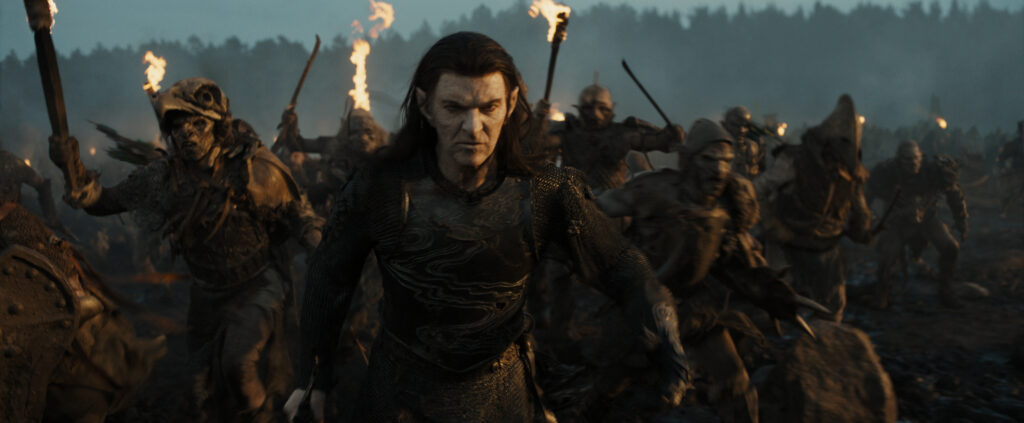
One of the first Elves?
GD: I wonder if that sense of maybe being able to outsmart Sauron is partly because Adar is one of the most ancient characters in the show. (Forget Tom Bombadil for a minute!) He is presumably one of the Elves from the first awakening of the Elves. How much did you fill in? (I thought we might actually get a name for him when I was watching episode eight!)
SH: I know! We made up a lot of names, some of them very silly – but I won’t go into them!
GD: How much of a backstory did you have in your own mind, about the centuries that this
character has been alive?
SH: I thought about it a lot. I loved that there was a line of Joseph’s in his first scene, with Ismael [Cruz Córdova] where he says, ‘I went down that river once. The banks were covered in sage blossoms…’ It had this kind of beauty and nostalgia of a life past, and a life lost, and that sort of sense… I don’t think he [Mawle] necessarily did it with regret, but it felt like there was something of that in there, for me. From then on it made me think that Adar regrets his decision to volunteer [to serve Morgoth] in order to get more power and to have children. He was duped, obviously, but I think that he must have been a very unhappy elf, you know – dissatisfied. He wanted more; I think he must have felt that he wasn’t given the respect he wanted – or felt he should have had, perhaps. And that dissatisfaction led to him wanting more – which is a very relatable thing. All humans want more, really – and that’s where the problems begin!
So I think over these centuries, for thousands of years, he feels he is responsible, in his mind anyway – or in part responsible – for the creation of the uruk as a race who are cannon fodder. He’s created lives that are going to be miserable; and it’s his fault, as far as he is concerned. So his raison d’etre is to take care of these Uruk as best he can, knowing that he is responsible for them. I think that’s all he really cares about.
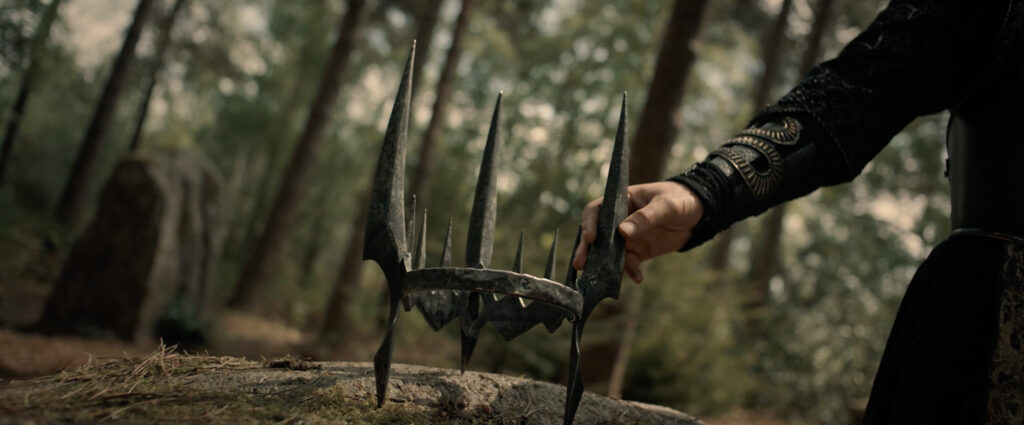
To be returned via Nenya [the ring of power worn by Galadriel], being healed by Nenya [in episode eight]; to have a glimpse, a really stark reminder of his life prior to that deal with Sauron and Morgoth… I think he’s finally got to a place he’s dreamed of millions of times since then – which is that he wishes he’d just been happy with what he had, and remained an Elf, and lived – possibly died – an Elf. But it’s too late now. It’s this incredible moment for him, and I think it stops him in his tracks. And that’s why he doesn’t go on and kill Sauron. He can’t do it; he can’t face him.
You know in Superman 2, when he loses his super powers? I felt like it was like that; it’s like his armour is gone and he’s starkly reminded of his fragility – and his “humanity”, in a way, as well. And so he needs Galadriel to take the mantle and to finish the job for him, because he can’t do it.
GD: It was a breathtaking moment to see him healed whilst wearing the ring; and it felt, to me at least, like an extremely noble gesture that he gave it back. That speaks something of his character. It’s interesting what you’re saying, that he perhaps couldn’t go on and so he had to give it back; but then it shows you something about an inherent depth to his persona, that he doesn’t say, ‘Aha, now I have this ring and it’s given me power!’
SH: And to take the rings from her as well – she’s got nine rings with her! I mean he succeeds, really, ultimately, in gaining the respect of the Elves. Galadriel is a very high Elf; and I think they feel like equals at that point. And that is something that he never had before, and that is the respect that he wanted. You know, it’s like the evil step-sister at the wedding – you’re the same as them, but you just feel like you’ve been cast out. And I think it’s as simple as that, that he finally has the respect of the Elves; or of Galadriel anyway. It’s a kind of homecoming for him, in a way.
GD: Unfortunately, though, he doesn’t have the love of some of his Uruks anymore by then.
SH: Because they don’t understand that he’s doing it all for them. And I think him being in Elven form is the last straw… First of all, he’s trying to make a deal with Elves, and they [the Uruks] don’t like that, and then he is an Elf again.
GD: It’s like ‘He was never really one of us.’
SH: Exactly. Can he be trusted with our fates anymore?
GD: And so you’ve just got your feet under the table, and now (presumably) we’re not going to see Adar anymore! That’s very sad, because he’s been a very popular character. He was created with a lot of regard, I think, for Tolkien’s writing, and cleverly combines various different origin stories that Tolkien had for the orcs: in some of the stories they were made, and in some of them they were corrupted Elves, so the showrunners have kind of combined the two. You’ve got ‘made’ orcs and a corrupted Elf. But it speaks a lot for both, first of all, Joseph Mawle’s performance, and then your performance, that this character has been so loved by the viewers in spite of not being a canon Tolkien character.
SH: Yes. I’m really glad of that. You know, Joseph is the one who started that. It’s a great character.
That kiss in episode 7…
GD: I have to ask you, before we come to the end of our time: there’s been a lot of reaction to the kiss between Galadriel and Elrond.
SH: You know, we talked about that a lot at the time, obviously.
GD: I was just going to ask you how Adar perceives it. He’s the one in the room at the time. From his angle, how does he perceive it?
SH: I was going to say “awks”! [laughs] Really bad pun, sorry! But anyway…
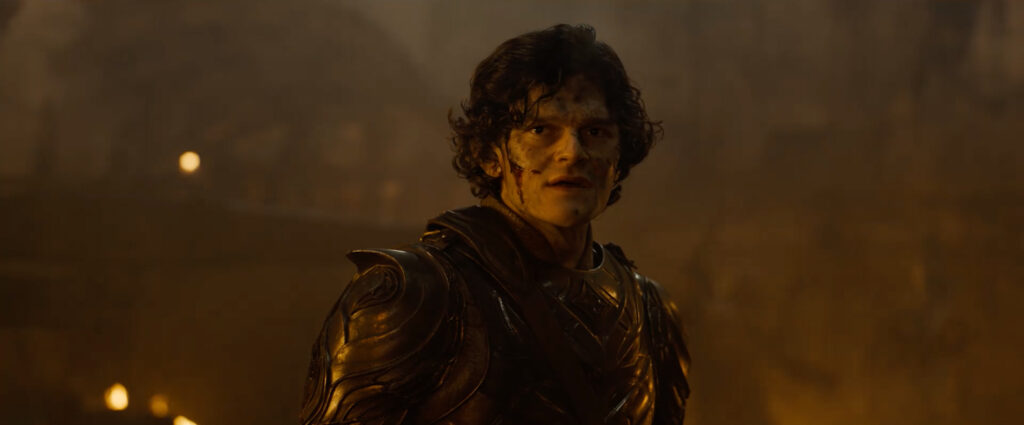
I saw a video – I think it was on Instagram – of Rob Aramayo talking about it, and I agreed with him completely. Nobody thinks about things more than Rob does. He is such a massive Tolkien fan and just such a clever and thoughtful guy. And yeah, as humans, we think, ‘Oh, romantic!’ – but it isn’t romantic. It’s a dear, dear friend; they’ve been through so much together – especially within the time of these two seasons. He’s not really sacrificing her, because he’s planning to save her – but there’s a chance [she might die]. But he gives her the thing so (hopefully) she can get away. Which she does! [feigns Adar-ish dismay] Yeah, that’s another story…
I think the kiss is transcendent. It’s a moment of pure beauty, as far as I’m concerned; of tenderness and real love. And it could be… when I say brotherly, sisterly, I’m not suggesting that brothers and sisters should be kissing each other on the mouth here in our world! If my sister reads this… [laughs] But this is different. This is Middle-earth and, you know, they have millennia between them and it’s a beautiful moment.
GD: Hearing you say that makes me think for Adar there’s some pathos there; because maybe that is the respect and love and camaraderie that he would have liked to have had with another Elf.
SH: Absolutely, yes. You’re absolutely right – that’s a really good point.
GD: Now I need to go back and watch it again from that perspective!
SH: I’ve actually watched episode 7 twice, because I loved it so much. Charlotte [Brändström, the director] did such an incredible job; and I love Bear’s music at the end. Bear is just great.
GD: Well, Sam, I’d love to say I’ll see you at the next press event; but unfortunately, perhaps not! – because I think your time in this version of Middle-earth has come to an end.
SH: I know, I know. It’s so sad.
GD: It has been such a pleasure to meet you and to hear a bit of your insight. Thank you for the seriousness with which I know you and all the cast approach your characters – with absolute seriousness. We really appreciate that as viewers, that there’s a professionalism and a depth of approach that is in no way dismissive of the work, or of fantasy as a genre.
SH: Yeah, not at all. It [fantasy] is everything! And thank you as well!




